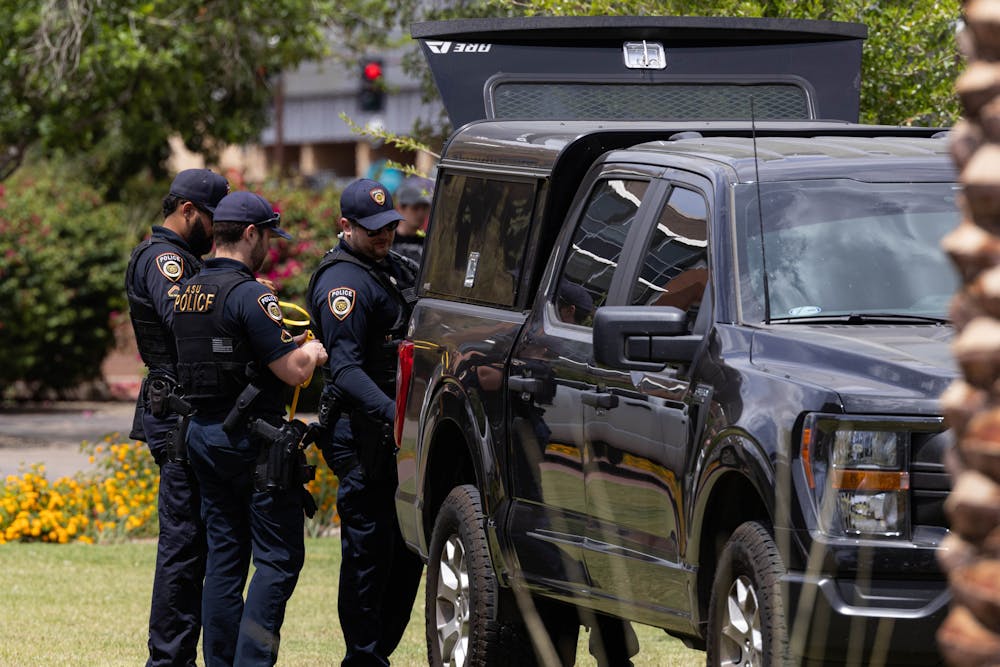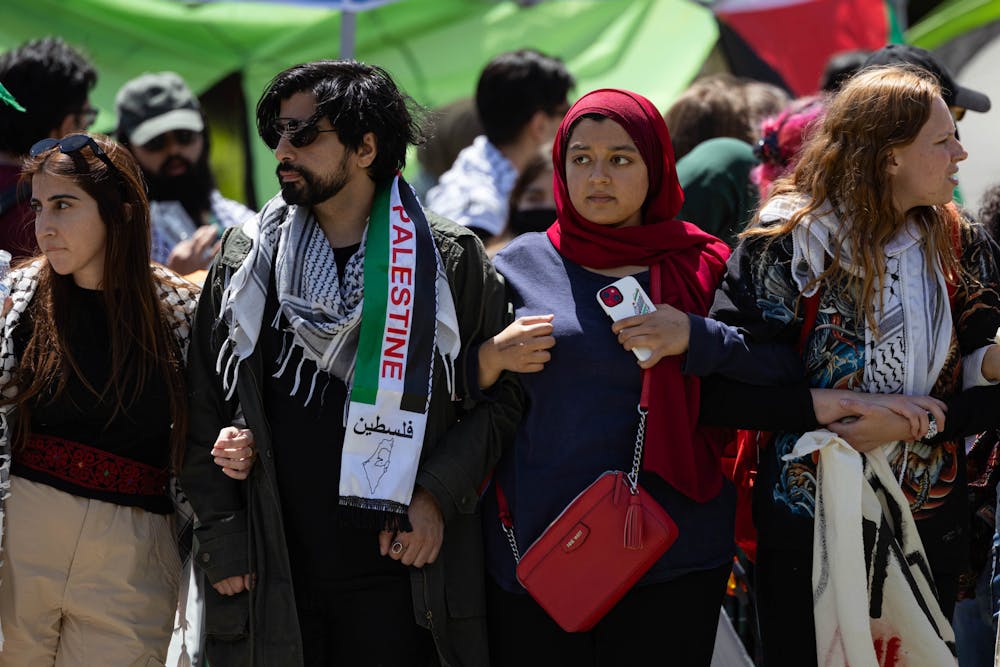All 20 of the students who were arrested at a pro-Palestine protest on April 26 and 27 have filed a lawsuit against the Arizona Board of Regents for infringing upon their freedom of speech. The group hopes to receive a preliminary injunction from the court, which would temporarily remove the suspension placed on the students so they would be able to complete outstanding assignments and finals.
The lawsuit filed on April 30 will be considered in the U.S. District Court for the District of Arizona.
There were 72 arrests in total, 20 of which were students, according to an ASU spokesperson. Similar encampment-style protests have occurred on several college campuses across the U.S., including Columbia, USC, UCLA and more. According to The New York Times, pro-Palestine protesters have either been arrested or detained on up to 60 college campuses since April 18.
Three arrests were made in the morning on April 26, but further arrests were delayed until after 11 p.m., which was the deadline to clear the area given to the protesters by ASU administration. After the deadline, 69 more people were arrested at the encampment. Those arrested were charged with criminal trespass in the third degree, which is defined as refusal to leave a property after request by law enforcement, according to Arizona Statute 13-1502.
READ MORE: ASU confirms 69 people arrested outside of Old Main in response to encampment early Saturday morning
"The April 26 encampment was more than a protest," the University wrote in a statement released on May 2. "There were multiple violations of university or ABOR policy including tents, overnight presence, creating a university disturbance and being in a reservable space that wasn't reserved by ASU students, per policy."
On Sunday, May 5, a pro-Palestine protester was arrested on suspicion of vandalizing an ASU sign during the encampment, according to an ASU Police spokesperson. At the time of the arrest, a pro-Israel rally was taking place at University Drive and College Avenue, where this person was counter-protesting.
READ MORE: Pro-Israel organizations host rally to show stance, unify Jewish community
Like many universities where arrests have taken place, ASU has received criticism, especially for employing Arizona State Troopers on students and for reports of police unlawfully removing students' hijabs during the arrests.
During the removal of the encampment, Emma Davis, a freshman studying architecture, linked arms with fellow protesters in an effort to protect each other and their belongings from interference by law enforcement. She said state troopers approached the protesters and took apart their property, including the tents and resources they set up throughout the day. Police then began separating protesters, unlinking their arms.
"When they got to me, they violently pulled me away from the group, and from there, I did not resist at all," Davis said. "It was two men who forcefully pulled me to the ground and arrested me from there."
According to Davis, those who were arrested were taken to "two large buses" where their hands were zip-tied and chains were put around their feet. Davis also said all face coverings were removed, including some peoples' hijabs.
The protesters were transported to a Maricopa County holding center where they were separated into groups of about 20 people and placed into different rooms. According to Davis, her group stayed there for nine hours until they were processed and sent to the Lower Buckeye Jail, where they were given release conditions from the court. Davis said the release conditions permitted that "students or anyone who lived on campus would be able to go back on campus to continue out the semester," but non-students would be banned from campus for a year.
Davis said the next day she received an email from ASU informing her of her interim suspension. The suspension prohibited the arrested students from living or being on campus, contacting professors, and completing assignments and finals. This also prevented seniors from attending Spring 2024 graduation ceremonies, such as Commencement and convocations.
David Chami, the attorney representing all of the students in the lawsuit and a graduate from ASU's law school said those who were arrested were specifically targeted for their cause.
He cited ASU's disapproval of the protesters usage of megaphones and Bluetooth speakers as "hypocritical" when others in the area who were not participating in the protest used speakers without facing repercussions. He also referenced ASU students, who were not apart of the encampment, who interfered with protesters' belongings, threw tents away and stepped on Palestinian flags past 11 p.m. without consequences or suspensions.
Chami referenced his time working for ASU's student legal services, prior to becoming a managing partner at Consumer Attorneys. As a lawyer, he has worked with students accused of vandalism or crimes resulting in monetary loss from the University. He compared their penalties to what the protesting students have experienced and said these crimes, among others, generally don't result in suspension.
"This was done to chill future speech," said Chami. "It was done to send a message that if you protest, you will have severe disproportionate consequences."
Chami is currently representing the 20 arrested students in this lawsuit, but there may be a separate lawsuit filed for civil rights violations.
According to Chami, the police violated the civil rights of students whose religious head coverings were removed during arrest. Chami said they should not have been removed in public or by male officers. Chami said he would likely work closely with the counsel of "three of the four women" whose hijabs were removed, though he is not currently representing them in that separate case.
The preliminary injunction was initially denied without prejudice by the judge, which means if Chami can gather evidence that the students arrested during the protest were treated differently than students in similar circumstances, then the judge would reconsider the motion at a later date.
The council released statements that if the suspensions were lifted, the students would be given the opportunity to complete their assignments and finals. However, final grades were due on May 6, as was ASU's Commencement ceremony for graduates and undergraduates.
ABOR responded to the lawsuit's claims that they infringed on students' free speech.
"The Board defends and upholds the First Amendment right to free expression," an ABOR spokesperson wrote in an email. "Individuals exercising these rights must nevertheless follow all applicable laws, university regulations, and the ABOR Code of Conduct. These rules and laws exist to protect teaching and learning on campus, uphold individuals' right to free speech and prioritize safety."
ASU President Michael Crow took the opportunity to comment on free speech at ASU's Commencement ceremony on Monday.
"Your last assignment," Crow said to students in the Graduate Class of Spring 2024. "Each of you find a way to pick one of them or all of them: the freedom of speech, freedom of religion, freedom from want and freedom from fear. And work on those and your life will have great meaning."
Chami said the University's claims of advocating for free speech are "hypocrisy at its finest."
"Fight for freedom of speech," Chami said. "But if you do, you'll be suspended from this University and potentially prevented from ever stepping foot on it again."
Editor's Note: This story was updated at 9:32 to include more precise language. This is a developing story and may be updated.
Edited by George Headley, Abigail Beck and Alexis Heichman
Reach the reporter at njarret1@asu.edu and @nataliajarrett on X.
Like The State Press on Facebook and follow @statepress on X.
Natalia is a sophomore studying journalism and mass communication. This is her fourth semester with The State Press. She has also worked as a politics reporter.





